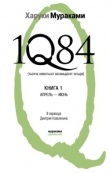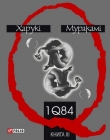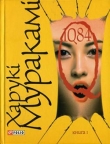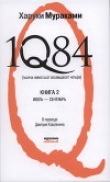
Текст книги "1q84"
Автор книги: Haruki Murakami
Жанр:
Современная проза
сообщить о нарушении
Текущая страница: 23 (всего у книги 81 страниц)
Tengo stopped reading at that point for a short breather. Fuka-Eri was listening intently, but he could not read any reaction from her expression.
“What do you think? Do you want me to keep reading? Or do you want to switch to another book?” he asked.
“I want to know more about the Gilyaks.”
“Okay, I’ll keep going.”
“Is it okay if I get in bed?” Fuka-Eri asked.
“Sure,” Tengo said.
They moved into the bedroom. Fuka-Eri crawled into bed, and Tengo brought a chair next to the bed and sat in it. He continued with his reading.
The Gilyaks never wash, so that even ethnographers find it difficult to put a name to the real colour of their faces; they do not wash their linen, and their fur clothing looks as if it has just been stripped off a dead dog. The Gilyaks themselves give off a heavy, acid smell, and you know you are near their dwellings from the repulsive, sometimes hardly bearable odour of dried fish and rotting fish offal. By each yurt usually lies a drying ground filled to the brim with split fish, which from a distance, especially when the sun is shining on them, look like filaments of coral. Around these drying grounds Kruzenshtern saw a vast number of maggots covering the ground to the depth of an inch.
“Kruzenshtern.”
“I think he was an early explorer. Chekhov was a very studious person. He had read every book ever written about Sakhalin.”
“Let’s keep going.”
In winter the yurts are full of acrid smoke which comes from the open fireplace, and on top of all this the Gilyaks, their wives and even the children smoke tobacco. Nothing is known about the morbidity and mortality of the Gilyaks, but one must form the conclusion that these unhealthy hygienic arrangements must inevitably have a bad effect on their health. Possibly it is to this they owe their small stature, the puffiness of their faces, and a certain sluggishness and laziness of movement.
“The poor Gilyaks!” Fuka-Eri said.
Writers give varying accounts of the Gilyaks’ character, but all agree on one thing—that they are not a warlike race, they do not like quarrels or fights, and they get along peacefully with their neighbours. They have always treated the arrival of new people with suspicion, with apprehension about their future, but have met them every time amiably, without the slightest protest, and the worst thing they would do would be to tell lies at people’s arrival, painting Sakhalin in gloomy colours and thinking by so doing to frighten foreigners away from the island. They embraced Kruzenshtern’s travelling companions, and when Shrenk fell ill this news quickly spread among the Gilyaks and aroused genuine sorrow. They tell lies only when trading or talking to a suspicious and, in their opinion, dangerous person, but, before telling a lie, they exchange glances with each other in an utterly childlike manner. Every sort of lie and bragging in the sphere of everyday life and not in the line of business is repugnant to them.
“The wonderful Gilyaks!” Fuka-Eri said.
The Gilyaks conscientiously fulfil commissions they have undertaken, and there has not yet been a single case of a Gilyak abandoning mail halfway or embezzling other people’s belongings. They are perky, intelligent, cheerful, and feel no stand-offishness or uneasiness whatever in the company of the rich and powerful. They do not recognize that anybody has power over them, and, it seems, they do not possess even the concept of “senior” and “junior.” People say and write that the Gilyaks do not respect family seniority either. A father does not think he is superior to his son, and a son does not look up to his father but lives just as he wishes; an elderly mother has no greater power in a yurt than an adolescent girl. Boshnyak writes that he chanced more than once to see a son striking his own mother and driving her out, and nobody daring to say a word to him. The male members of the family are equal among themselves; if you entertain them with vodka, then you also have to treat the very smallest of them to it as well. But the female members are all equal in their lack of rights; be it grandmother, mother or baby girl still being nursed, they are ill treated in the same way as domestic animals, like an object which can be thrown out, sold or shoved with one’s foot like a dog. However, the Gilyaks at least fondle their dogs, but their womenfolk—never. Marriage is considered a mere trifle, of less importance, for instance, than a drinking spree, and it is not surrounded by any kind of religious or superstitious ceremony. A Gilyak exchanges a spear, a boat or a dog for a girl, takes her back to his own yurt and lies with her on a bearskin—and that is all there is to it. Polygamy is allowed, but it has not become widespread, although to all appearances there are more women than men. Contempt toward women, as if for a lower creature or object, reaches such an extreme in the Gilyak that, in the field of the question of women’s rights, he does not consider reprehensible even slavery in the literal and crude sense of the word. Evidently with them a woman represents the same sort of trading object as tobacco or nankeen. The Swedish writer Strindberg, a renowned misogynist, who desired that women should be merely slaves and should serve men’s whims, is in essence of one and the same mind as the Gilyaks; if he ever chanced to come to northern Sakhalin, they would spend ages embracing each other.
Tengo took a break at that point, but Fuka-Eri remained silent, offering no opinion on the reading. Tengo continued.
They have no courts, and they do not know the meaning of “justice.” How hard it is for them to understand us may be seen merely from the fact that up till the present day they still do not fully understand the purpose of roads. Even where a road has already been laid, they will still journey through the taiga. One often sees them, their families and their dogs, picking their way in Indian file across a quagmire right by the roadway.
Fuka-Eri had her eyes closed and was breathing very softly. Tengo studied her face for a while but could not tell whether she was sleeping or not. He decided to turn the page and keep reading. If she was sleeping, he wanted to give her as sound a sleep as possible, and he also felt like reading more Chekhov aloud.
Formerly the Naibuchi Post stood at the river mouth. It was founded in 1866. Mitzul found eighteen buildings here, both dwellings and non-residential premises, plus a chapel and a shop for provisions. One correspondent who visited Naibuchi in 1871 wrote that there were twenty soldiers there under the command of a cadet-officer; in one of the cabins he was entertained with fresh eggs and black bread by a tall and beautiful female soldier, who eulogized her life here and complained only that sugar was very expensive.
Now there are not even traces left of those cabins, and, gazing round at the wilderness, the tall, beautiful female soldier seems like some kind of myth. They are building a new house here, for overseers’ offices or possibly a weather center, and that is all. The roaring sea is cold and colourless in appearance, and the tall grey waves pound upon the sand, as if wishing to say in despair: “Oh God, why did you create us?” This is the Great, or, as it is otherwise known, the Pacific, Ocean. On this shore of the Naibuchi river the convicts can be heard rapping away with axes on the building work, while on the other, far distant, imagined shore, lies America … to the left the capes of Sakhalin are visible in the mist, and to the right are more capes … while all around there is not a single living soul, not a bird, not a fly, and it is beyond comprehension who the waves are roaring for, who listens to them at nights here, what they want, and, finally, who they would roar for when I was gone. There on the shore one is overcome not by connected, logical thoughts, but by reflections and reveries. It is a sinister sensation, and yet at the very same time you feel the desire to stand for ever looking at the monotonous movement of the waves and listening to their threatening roar.
It appeared that Fuka-Eri was now sound asleep. He listened for her quiet breathing. He closed the book and set it on the little table by the bed. Then he stood up and turned the light off, taking one final look at Fuka-Eri. She was sleeping peacefully on her back, her mouth a tight, straight line. Tengo closed the bedroom door and went back to the kitchen.
It was impossible for him to continue with his own writing, though. His mind was now fully occupied by Chekhov’s desolate Sakhalin coastal scenes. He could hear the sound of the waves. When he closed his eyes, Tengo was standing alone on the shore of the Sea of Okhotsk, a prisoner of his own meditations, sharing in Chekhov’s inconsolable melancholy. What Chekhov must have felt there at the end of the earth was an overwhelming sense of powerlessness. To be a Russian writer at the end of the nineteenth century must have meant bearing an inescapably bitter fate. The more they tried to flee from Russia, the more deeply Russia swallowed them.
After rinsing his wineglass and brushing his teeth, Tengo turned off the kitchen light, stretched out on the sofa, pulled a blanket over himself, and tried to sleep. The roar of the ocean still echoed in his ears, but eventually he began to lose consciousness and was drawn into a deep sleep.
He awoke at eight thirty in the morning. There was no sign of Fuka-Eri in his bed. The pajamas he had lent her were balled up and tossed into the bathroom washing machine, the cuffs and legs still rolled up. He found a note on the kitchen table: “How are the Gilyaks doing now? I’m going home.” Written in ballpoint pen on notepaper, the characters were small, square, and indefinably strange, like an aerial view of characters written on a beach in seashells. He folded the paper and put it in his desk drawer. If his girlfriend found something like this when she arrived at eleven, she would make a terrible fuss.
Tengo straightened the bed and returned the fruits of Chekhov’s labor to the bookcase. Then he made himself coffee and toast. While eating breakfast, he noticed that some kind of heavy object had settled itself in his chest. Some time had to go by before he figured out what it was. Fuka-Eri’s tranquil sleeping face.
Could I be in love with her? No, impossible, Tengo told himself. It just so happens that something inside her has physically shaken my heart. So, then, why am I so concerned about the pajamas she had on her body? Why did I (almost unconsciously) pick them up and smell them?
There were too many questions. It was probably Chekhov who said that the novelist is not someone who answers questions but someone who asks them. It was a memorable phrase, but Chekhov applied this attitude not only to his works but to his life as well. His life presented many questions but answered none. Although he knew quite well that he was suffering from an incurable lung disease (as a doctor, he could not help but know), he tried hard to ignore the fact, and refused to believe he was dying until he was actually on his deathbed. He died young, violently coughing up blood.
Tengo left the kitchen table, shaking his head. My girlfriend is coming today. I have to do laundry and clean the place up now. Thinking is something I can save for later.
CHAPTER 21
Aomame
NO MATTER HOW FAR AWAY I TRY TO GO
Aomame went to the ward library and, following the same procedures as before, opened the compact edition of the newspaper on a desk. She was there to read once again about the gun battle between the radical faction and the police that had taken place in Yamanashi Prefecture in the autumn three years earlier. The headquarters of Sakigake, the religious group that the dowager had mentioned, was located in the mountains of Yamanashi, and the gun battle had also occurred in the mountains of Yamanashi. This might have been a mere coincidence, but Aomame was not quite ready to accept that. There might well have been some link between the two. And the expression that the dowager had used—“such a major incident”—also seemed to suggest a connection.
The gunfight had occurred three years earlier, in 1981 (or, according to Aomame’s hypothesis, three years prior to 1Q84), on October 19. Having read the news reports during her previous trip to the library, Aomame had fairly detailed knowledge of the facts. This enabled her to skim through that material and concentrate instead on subsequent related articles and analyses that viewed the affair from different angles.
In the first battle, three officers had been killed and two badly wounded by Chinese-made Kalashnikov automatic rifles. After that, the radical group fled into the mountains with their weapons and the police staged a major manhunt. Fully armed Self-Defense Force paratroopers were also sent in by helicopter. Three radicals who resisted the onslaught were shot to death, two were gravely wounded (one of those died in the hospital three days later, but the fate of the other was not clearly stated in the article), and four others were arrested unharmed or slightly wounded. Wearing high-performance bulletproof vests, the police and Self-Defense troops suffered no further casualties except for one policeman’s broken leg when he fell off a cliff in pursuit of the radicals. Only one of the radicals was listed as whereabouts unknown. He had apparently managed to disappear in spite of the extensive search.
Once the initial shock of the gun battle wore off, the newspaper started carrying detailed reports on the origins of the radical group, which was seen as the fallout from the university campus uprisings that occurred around 1970. More than half of the members were veterans of the takeover of Yasuda Hall at the University of Tokyo or the sit-in at Nihon University. After their “fortresses” had fallen to the riot police, these students (and a few faculty members) had been expelled from their universities or become disillusioned with urban political action centered on the university campuses. They overcame their factional differences and started a communal farm in Yamanashi Prefecture. At first they participated in the agricultural commune known as the Takashima Academy, but they were not satisfied with the life there. They reorganized, went independent, bought an abandoned village deep in the mountains at an exceptionally low price, and started farming there. They experienced many hardships at first, but they eventually succeeded in the mail order sale of vegetables when the use of organically grown produce began a quiet boom in the cities. Their farm grew. They were, ultimately, serious, hardworking people whose leader had organized them well. The name of the commune was Sakigake.
Aomame twisted her face into a major grimace and swallowed hard. She let out a deep groan and started tapping the surface of the desk with her ballpoint pen.
She continued reading. She read through the news reports that explained how a deep split grew within the ranks of Sakigake between a moderate group that rejected a violent revolution as acceptable for contemporary Japan, and a radical faction that eventually founded a nearby commune and took the name Akebono. She learned how they were granted religious status by the government in 1979.
After the radical group moved to their own property, they underwent secret military training even as they continued to farm, which gave rise to several clashes with neighboring farmers. One such clash involved water rights over a stream that flowed through Akebono’s land. The stream had always been used as a common source of water by farms in the area, but Akebono denied neighboring residents entry. The dispute went on for a number of years, until several Akebono members severely beat a resident who had complained about the barbed wire fence surrounding their land. The Yamanashi Prefectural Police obtained a search warrant and headed for Akebono to question the suspects, only to become involved in a wholly unanticipated shootout.
After Akebono was all but obliterated by the intense gun battle in the mountains, the religious organization Sakigake lost no time in issuing a formal statement. A handsome, young spokesman in a business suit read the document to the media at a press conference. The point of the statement was quite clear. Whatever their relationship might have been in the past, Sakigake and Akebono now had no connection at all. After the two groups parted ways, there had been hardly any contact aside from certain operational matters. They had separated amicably after concluding that, as a community devoted to farming, respect for the law, and longing for a peaceful spiritual world, Sakigake could no longer work with the members of Akebono, who pursued a radical revolutionary ideology. After that, Sakigake had become a religious organization and had been legally certified as a Religious Juridical Person. That such an incident involving bloodshed had occurred was truly unfortunate, and Sakigake wished to express its deep sympathy for the families of the officers who had lost their lives in the course of their duties, but Sakigake was in no way involved. Still, it was an undeniable fact that Sakigake had been the parent organization of Akebono. Consequently, if the authorities deemed it necessary to conduct some sort of investigation in connection with the present incident, Sakigake was fully prepared to comply so as to avoid pointless misunderstanding.
A few days later, as if in response to Sakigake’s formal statement, the Yamanashi Prefectural Police entered the organization’s precincts with a search warrant. They spent an entire day covering all parts of Sakigake’s extensive property and carefully examining their buildings’ interiors and their files. They also questioned several members of the group’s leadership. The police suspected that the two groups’ contacts were as active as ever and that Sakigake was surreptitiously involved in Akebono’s activities. But they found no evidence to support this view. Scattered along the trails winding through the beautiful deciduous forest were wood-frame meditation huts where many members dressed in ascetic robes were engaged in religious austerities, nothing more. Nearby, other adherents were engaged in farming. There was an array of well-maintained farming implements and heavy farm machinery. The police found no trace of weapons or anything else suggesting violence. Everything was clean and orderly. There was a nice little dining hall, a lodging house, and a simple (but adequately equipped) medical facility. The two-floored library was well stocked with Buddhist scriptures and books, among which several experts were engaged in studies and translations. Overall, the place seemed less like a religious establishment than the campus of a small private college. The police left deflated, having found almost nothing of value.
Some days later, the group welcomed television and newspaper reporters, who observed much the same scenes the police had found. They were not taken around on carefully controlled tours, as might be expected, but were allowed to wander freely throughout the property unaccompanied, to speak with anyone they wanted to interview, and to write up their discoveries as they wished. The one restriction agreed upon was that the media would use only television and photographic images approved by the group in order to protect the privacy of individual members. Several ascetic-robed members of the leadership answered reporters’ questions in a large assembly hall, explaining the organization’s origins, doctrines, and administration. Their manner of speaking was courteous but direct, eschewing any hint of the kind of propaganda often associated with religious groups. They seemed more like top employees of an advertising agency, skilled presenters, rather than leaders of a religion. The only thing different was the clothes they wore.
We do not have any set, clear-cut doctrine, they explained. We perform theoretical research on early Buddhism and put into actual practice the ascetic disciplines that were engaged in back then, aiming for a more fluid religious awakening. We do not hold that doctrine gives rise to awakening but rather that the individual awakenings come first. This is our fundamental principle. In that sense, our origin differs greatly from those of established religions.
Now, as to our funding: like most other religious organizations, we depend in part on the spontaneous contributions of our believers. Our ultimate goal, however, is to establish a frugal, self-sufficient lifestyle through our farming, rather than depending on contributions. For us, “less is more”: we aim to achieve spiritual peace through the purification of the body and the discipline of the mind. One after another, people who have sensed the emptiness of competitive society’s materialism have entered our gates in search of a different and deeper spiritual axis. Many of them are highly educated professionals with social standing. We are not trying to be one of those “fast food,” “new” religions that pretend to take on people’s worldly suffering and save anyone and everyone. Salvation of the weak is of course an important task, but it may be best to think of us as a kind of “graduate school,” providing a suitable place and appropriate support to people who are strongly motivated to save themselves.
Major differences of opinion arose at one point between us and the people of the Akebono commune concerning matters of administrative policy, and we were at odds with them for a time, but talks between us led to an amicable meeting of the minds. We then separated, each of us following a different path. Akebono pursued its ideals in its own pure-minded and ascetic way, but with those disastrous—and genuinely tragic—results. The single greatest cause was that they had become too doctrinaire and lost touch with actual, living society. For us, too, the event has driven home the message that we must continue to be an organization that keeps a window open to the outside even as we impose ever stricter discipline upon ourselves. We believe that violence solves nothing. We hope you understand that we do not force religion on anyone. We do not proselytize, nor do we attack other religions. All we do is offer an appropriate and effective communal environment to people in search of spiritual awakening.
. . .
Most of the journalists present left with a favorable impression of the organization. All of the believers, both men and women, were slim, relatively young (though older people had been spotted on occasion), and beautifully clear-eyed. They were courteous in speech and behavior. None of them evidenced an inclination to speak extensively about their pasts, but most did indeed appear to be highly educated. The lunch served to the journalists had been simple fare (much the same sort of food eaten by believers, supposedly) but delicious in its own way, all ingredients having been freshly harvested on the organization’s land.
Subsequently, the media defined Akebono as a mutant offspring that Sakigake had had to shake off. A revolutionary ideology based on Marxism had become outmoded and useless in 1980s Japan. The youth with radical political aspirations in 1970 were now working for corporations, engaged in the forefront of fierce fighting on an economic battlefield. Or else they had put distance between themselves and the battle and clamor of real society, each in search of personal values in a place apart. In any case, the times had changed, and the season for politics was now a thing of the distant past. Sakigake was one hopeful option for a new world; Akebono had no future.
Aomame set down her pen and took a deep breath. She pictured to herself the eyes of Tsubasa, so utterly lacking in expression or depth. Those eyes had been looking at Aomame, but at the same time they had been looking at nothing. Something important was missing.
It’s not as simple as all that, Aomame thought. Sakigake can’t be this clean. It has a hidden dark side. The dowager says this “Leader” person is raping preteen girls and calling it a religious act. The media didn’t seem to know anything about that. They were only there half a day. They were guided through the orderly facilities for religious practice, they were fed a lunch made with fresh ingredients, they were treated to beautiful explanations of spiritual awakening, and they went home satisfied. They never had a glimpse of what was really going on inside.
Aomame went straight from the library to a café, where she ordered a cup of coffee and used the phone to call Ayumi at her office, on the number that Ayumi had told her she could call anytime. A colleague picked up the phone. Ayumi was out making rounds but should be back at the station in about two hours, he said. “I’ll call again later,” Aomame said without giving her name.
She went back to her apartment and dialed the number again two hours later. This time Ayumi answered the phone herself.
“Hi, Aomame, how are you?”
“Fine, how are you?”
“Nothing wrong with me that a good man wouldn’t fix. How about you?”
“Same here,” Aomame said.
“Too bad,” Ayumi said. “There must be something wrong with the world if women like us have to complain to each other about overly healthy sex drives. We’ll have to do something about that.”
“True, but … uh, is it okay for you to be saying stuff like that out loud? You’re on duty, right? Isn’t anybody else around?”
“Don’t worry, you can talk to me about anything.”
“Well, I’ve got a favor to ask if it’s something you can do for me. I can’t think of anyone else I can go to for this.”
“Sure,” Ayumi said. “I don’t know if I can help or not, but give it a try.”
“Do you know of a religious group called Sakigake? It’s headquartered in Yamanashi Prefecture, in the hills.”
“Sakigake? Hmm.” Ayumi took some ten seconds to search her memory. “I think I know it. It’s a kind of religious commune, isn’t it? The Akebono radicals that started the gun battle in Yamanashi used to belong to it. Three prefectural policemen died in the shootout. It was a real shame. But Sakigake had nothing to do with it. Their compound was searched after the shootout and came up clean. So …?”
“I’d like to know if Sakigake was involved in any kind of incident after the shootout—criminal, civil, anything. But I don’t know how to go about looking into such things. I can’t read all the compact editions of all the newspapers, but I figured the police probably had some way of finding out.”
“It’s easy, we just have to do a quick search on our computer—or, at least, I wish I could say that, but I’m afraid computerization is not so advanced in Japan’s police forces. I suspect it’ll take a few more years to get to that stage. So for now, if I wanted to find out about something like that, I’d probably have to ask the Yamanashi Prefectural Police to send copies of the related materials in the mail. And for that I’d first have to fill out a materials request form and get my boss’s okay. Of course I’d have to give a good reason for the request. And we’re a government office, after all, so we’re getting paid to make things as complicated as possible.”
“I see,” Aomame said with a sigh. “So that’s out.”
“But why do you want to know something like that? Is some friend of yours mixed up in some kind of case connected to Sakigake?”
Aomame hesitated a moment before deciding to tell Ayumi the truth. “Close. It involves rape. I can’t go into detail yet, but it’s about the rape of young girls. I’ve been informed that they’re systematically raping them in there under cover of religion.”
Aomame could sense Ayumi wrinkling her brow at the other end. “The rape of young girls, huh? We can’t let that happen,” Ayumi said.
“Of course we can’t,” Aomame said.
“What do you mean by ‘young’?”
“Maybe ten, or even younger. Girls who haven’t had their first period, at least.”
Ayumi went silent for a while. Then, in a flat voice, she said, “I see what you mean. I’ll think of something. Can you give me two or three days?”
“Sure. Just let me know.”
They spent the next few minutes in unrelated chatter until Ayumi said, “Okay, I’ve got to get back to work.”
After hanging up, Aomame sat in her reading chair by the window and stared at her right hand for a while. Long, slim fingers, closely trimmed nails. Nails well cared for but unpolished. Looking at her nails, Aomame had a strong sense of what a fragile, fleeting thing her own existence was. Something as simple as the shape of her fingernails: it had been decided without her. Somebody else made the decision, and all I could do was go along with it, like it or not. Who could have decided that this was how my nails would be shaped?
The dowager had recently said to her, “Your parents were—and still are—ardent believers in the Society of Witnesses.” Which meant that they were probably still devoting themselves to missionary work even now. Aomame had a brother four years her senior, a docile young man. At the time Aomame made up her mind to leave home, he was still living according to his parents’ instructions, keeping the faith. What could he be doing now? Not that Aomame had an actual desire to know what was happening with her family. To her, they were just a part of her life that had ended. The ties had snapped.
Aomame had struggled for a long time to forget everything that had happened to her before the age of ten. My life actually started when I was ten. Everything before that was some kind of miserable dream. Let me throw those memories away somewhere. But try as she might, her heart was constantly being drawn back into that nightmarish world. It seemed to her that almost everything she possessed had its roots sunk in that dark soil and was deriving its nourishment from it. No matter how far away I try to go, I always have to come back here, she thought.
I must send that “Leader” into the other world, Aomame told herself, for my own sake as well.





